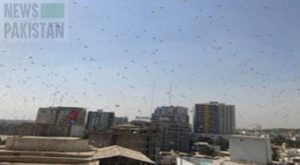KARACHI: Pakistan seems to have yet another threat lurking underneath sands in the form of locusts.
Participants of a meeting convened on Friday by the Prime Minister, had agreed to declare emergency and approved a National Action Plan that would need Rs. 7.3 billion in order to successfully destroy the menace of locusts.
It is pertinent to mention here that the KP Govt had earlier declared emergency to control spread of locust in nine southern districts: Dera Ismail Khan, Tank, Lakki Marwat, Bannu, Karak, Kohat, Hangu, North and South Waziristan districts.
Relevant pieces published earlier:
Desert Locust: Rs. 459.5m approved by ECC
12th of December 2019
ISLAMABAD: In order to contain the desert locust threat effectively on war footing Economic Coordination Committee (ECC) has approved a grant of Rs. 459.5 million during a meeting held here today with PM’s Advisor on Finance Dr Abdul Hafeez Shaikh in the chair.
ECC was informed that nine districts of the country were affected by the Locust and the Department of Plant Protection had been given the responsibility of dealing with the threat. According to details provided so far 170,000 hectares have been cleared.
Controlling desert locusts: 100,000 tons of pesticides to be imported
ISLAMABAD: NA Standing Committee on Food Security has been informed here on Thursday (21st of November, 2019) by the Ministry of Food Security and Research that an amount of Rs. 500 million had been allocated to contain the menace of desert locusts in Sindh and Balochistan.
Briefing the Committee, National Food Security and Research Secretary Hashim Popalzai told that 100,000 tons of pesticides (Malathion) would be imported in order to control the attack that might take place in a couple of years. It is pertinent to mention here that locusts had laid eggs in the affected areas and it is expected that the larvae would remain there for two to three years.
According to Popalzai aircraft were being used for aerial spray on areas where desert locust was concentrating. It has been informed that an area of 131,130 hectares had been treated. Ministry had further informed that 115,455 liters of pesticides had so far been sprayed on 5,000 hectares in Sindh and Balochistan. The operation continues in the infested areas.
Other areas where the aerial spray operation had been carried out include Benazirabad. The department claims to have sprayed an area of 1000 hectares till 20th of November, 2019. Locust and their nymph had been destroyed by means of aerial spray. NA Committee has been informed that one Beaver Aircraft would be deployed to make successfully carrying the operation. The plant protection department had claimed that they were geared to deploy its aircraft in Balochistan.
The NA Standing Committee has been informed that sufficient stock of pesticide was already in the stock and an action has been chalked out for effective desert locust management. The locust is expected to migrate towards Balochistan and concerned authorities had planned to start early survey there to contain any desert locust activity as soon as it is noticed.
Locust invasion in Karachi, Cricket match stopped at National Stadium
KARACHI: Desert locust invaded the Metropolis today in Malir, Gadap, National Stadium (Gulshan-e-Iqbal), Shahra-e-Faisal areas today. This region happens to be part of the creature’s migration to coastal areas of Balochistan.
Relevant authorities assured that the invasion did not pose any risk to food supply. According to detail desert locust fly during day time and settle during the night and since locusts are not in search of food they do not cause any damage to crops.
Desert locust control teams are prepared to overcome any risks they might pose. Since March 2019 Pakistan government has surveyed an area of 550,000 hectares and secured 110,000 hectares areas by ground and aerial spray in Balochistan, Sindh and Punjab limiting locusts to desert areas.
It is pertinent to mention here that since a single swarm ranges from 100,000 to 1 billion locusts, when their attack results into great loss to the cultivators. According to karachiites, before today’s invasion, locust activity was noted here some 58 years ago back in 1961.

https://www.instagram.com/sunitamarshallofficial/?utm_source=ig_embed
MULTAN: Commissioner Imran Sikandar Baloch has ordered for taking urgent steps to tackle possible attack of locust (Tidi-Dil) on crops.
The administrations of districts Lodhran, Vehari, Khanewal and Multan were directed to launch a survey to check locust attack on crops. Earlier, locust had badly affected crops in some parts of Sindh and Balochistan.
The commissioner directed the administrations to call meetings of stakeholders for making a joint strategy against possible attack of locust. A detail report about precautionary measures would be submitted to the Punjab government, said an official source.app
News Pakistan











